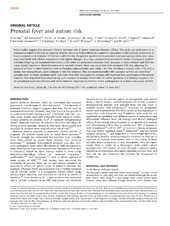Prenatal fever and autism risk
Hornig, Mady; Bresnahan, M; Che, X; Schultz, A F; Ukaigwe, J E; Eddy, M L; Hirtz, Deborah; Gunnes, Nina; Lie, Kari Kveim; Magnus, Per; Mjaaland, Siri; Reichborn-Kjennerud, Ted; Schjølberg, Synnve; Øyen, Anne-Siri; Levin, B; Susser, Ezra; Stoltenberg, Camilla; Lipkin, W I
Peer reviewed, Journal article
Published version

Åpne
Permanent lenke
https://hdl.handle.net/1956/16262Utgivelsesdato
2017Metadata
Vis full innførselSamlinger
Originalversjon
https://doi.org/10.1038/mp.2017.119Sammendrag
Some studies suggest that prenatal infection increases risk of autism spectrum disorders (ASDs). This study was undertaken in a prospective cohort in Norway to examine whether we could find evidence to support an association of the prenatal occurrence of fever, a common manifestation of infection, with ASD risk. Prospective questionnaires provided maternal exposure data; case status was established from clinical assessments and registry linkages. In a large, prospectively ascertained cohort of pregnant mothers and their offspring, we examined infants born greater than or equal to 32 weeks for associations between fever exposure in each trimester and ASD risk using logistic regression. Maternal exposure to second-trimester fever was associated with increased ASD risk, adjusting for presence of fever in other trimesters and confounders (adjusted odds ratio (aOR), 1.40; 95% confidence interval, 1.09–1.79), with a similar, but nonsignificant, point estimate in the first trimester. Risk increased markedly with exposure to three or more fever episodes after 12 weeks' gestation (aOR, 3.12; 1.28–7.63). ASD risk appears to increase with maternal fever, particularly in the second trimester. Risk magnified dose dependently with exposure to multiple fevers after 12 weeks' gestation. Our findings support a role for gestational maternal infection and innate immune responses to infection in the pathogenesis of at least some cases of ASD.
